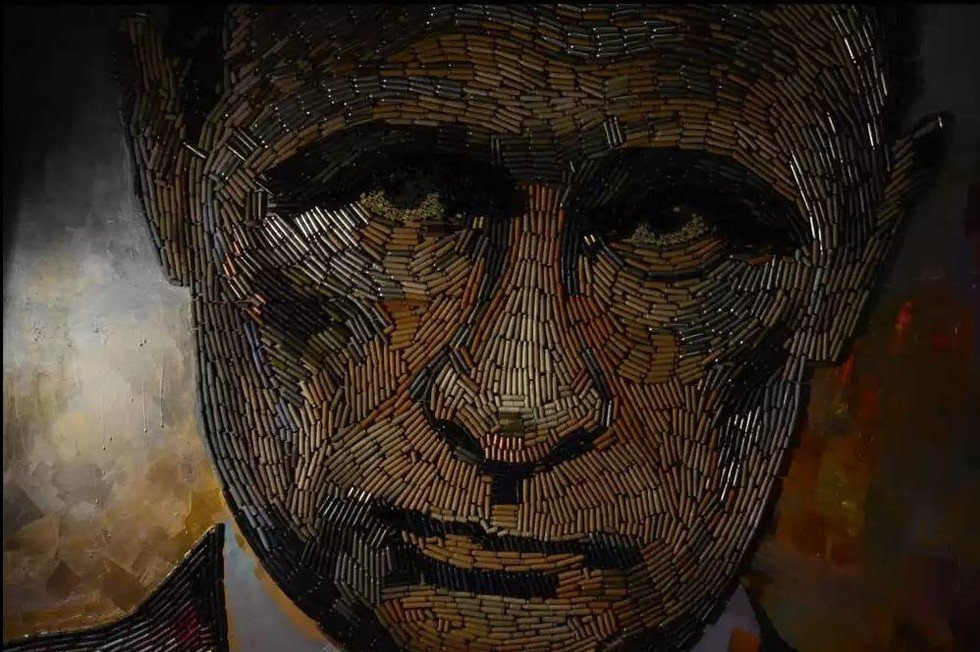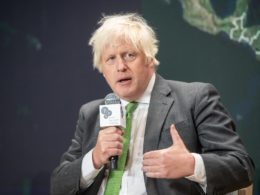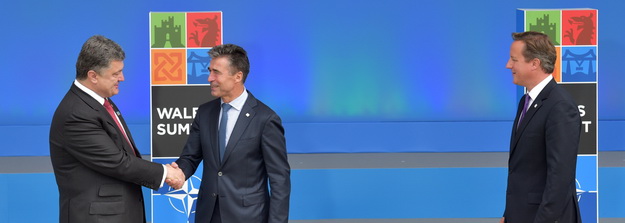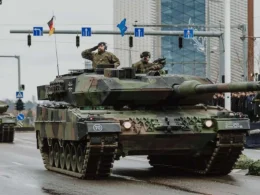The statement comes after more than a month of increasing tensions near the Russian-Ukrainian-Belarusian border that had experts worldwide guessing whether Russia would invade. We asked several security experts why this statement of Putin comes at such a time and what it aims to achieve.

James Sherr, Senior Fellow, Estonian Foreign Policy Institute at the International Centre for Defence and Security, Tallinn, Associate Fellow, Russia & Eurasia Programme, Chatham House, London
By voicing his "insistence" on "substantive negotiations" between Russia and NATO, Putin will reinforce the judgement, if not necessarily the comfort, of those who believe that Russia’s recent military activity on Ukraine’s borders is nothing more than the latest exercise in coercive intimidation.
Whether or not this is true, Putin’s gambit is fraudulent. As with his article on "the historical unity of Russia and Ukraine," so is his narrative. The declassified documents are clear: no guarantee regarding NATO’s future enlargement was sought or given. Former US Secretary of State James Baker, who supposedly gave such a guarantee, and Mikhail Gorbachev, who supposedly received it, have since confirmed as much. The texts of the Charter of Paris and the NATO-Russia Founding Act — the first signed by the USSR, the second by the Russian Federation — also confirm it. If Putin believes otherwise, those beliefs should bind him rather than ourselves.
History aside, the threat is very real. If Russia’s menacing deployments are the first shoe to drop, then Putin’s demand — an ultimatum by any definition — is the second. It is not simply a "guarantee" of no enlargement that he seeks, but the withdrawal of NATO weapons systems and "infrastructure" from the vicinity of Russia’s borders.
On the margins of Putin’s statement, "independent" Russian spokesmen, but spokesmen nonetheless, add that the EU must give such an undertaking as well. In sum, a Russian sphere of influence must be agreed in fact if not in name.
For the United States, let alone NATO to accept such an ultimatum would rip up almost thirty years of policy, not to say solemn assurances and methodical, collaborative effort. The mere suggestion that Putin’s "proposal" should be "explored" or "provide a basis for discussion" would send shivers across the Alliance and provoke volleys of outrage. Even if nothing were to come of it, the damage to NATO’s cohesion and credibility would be profound.
[bctt tweet="The lesson would be plain to the deaf, dumb, and blind: at the first real challenge, NATO abandons everything that it stands for. All without a shot being fired." username="euromaidanpress"]
But because these consequences are strikingly clear, the likelihood that NATO will concede Russia’s terms is exceedingly remote.
That restores the threat that has never receded: making Ukraine and its Western "masters" concede them by force of arms. Contrary to so much that has been written, kinetic conflict is not the opposite of coercive intimidation; it is one of its ingredients. Russia’s aim would not be to occupy territory but to destroy Ukraine’s military forces, undoing seven years of investment and destroying all hope that Ukraine will ever be secure "apart from Russia." It is these calculations that we need to address and that assault which we need to deter.

Maria Avdeeva, Research Director at the European Expert Association
Putin's latest statement on demands for guarantees of non-NATO expansion to the east is part of a general strategy to escalate Russia's relations with the West. Putin does not want to acknowledge the geopolitical loss of the Russian Federation and seeks to reconsider the balance of power that has been established since the end of the Cold War.
[bctt tweet="Putin's main goal now is to divide the spheres of influence and restore Moscow's role as one of the global decision-making centers." username="euromaidanpress"]
First of all, the Kremlin is addressing the United States with this statement, indicating the area of its priority interests. Moscow understands that no guarantees affecting Ukraine's sovereignty will be provided, and NATO's response to the statement could be used by Russia for the next stage of escalation and justification of aggression.
Stoltenberg has already reacted harshly to Putin's statement, saying that NATO considers it unacceptable for Russia to have its own sphere of influence, since all its neighbors are sovereign states. The same reaction should be expected from the United States. The main argument here will be the fact that it is not NATO expanding to the east, but sovereign countries democratically deciding to join. However, it is possible that some western politicians will try to justify their refusal to admit Ukraine to NATO by "not provoking Russia."
Putin's statements are accompanied by an active disinformation campaign aimed at portraying Ukraine as an aggressor on the one hand and demonstrating a lack of international subjectivity on the other. At the same time, there are reports of a threat from NATO to Russia. These theses are voiced by Putin personally, and they are instantly disseminated through the pro-Kremlin media network.
It would be appropriate to conduct an analysis of Putin's statement, including a legal one, with a clear definition of threats to both Ukraine and democratic countries. In addition, Ukraine could initiate resolutions or joint statements by the EU and NATO on the inadmissibility of interference in Ukraine's internal affairs.

Hans Petter Midttun, former Defence Attache to Ukraine and nonresident fellow at Centre for Defence Strategies
It is now clear that the last month of aggressive actions, including its military build-up along the Ukrainian border, the migration crisis on the Polish borders, and its increasingly belligerent rhetoric directed at both NATO and Ukraine was just a backdrop to President Putin's demand.
After ramping up tensions, Putin now offers the USA, the EU, and NATO a glimmer of hope of a political solution to the problem he created. In this, he follows the strategy of Hybrid War, which is designed to ensure victory through limited use of military power by destabilizing nations from within, creating fear, and fostering inaction.
[bctt tweet="Putin's statement is yet another step in Russia's strategy: to confuse and manipulate both Ukraine and the West into making the political decisions Russia wants. It wants Ukraine to give in, and the West to keep its “hands off Ukraine.” " username="euromaidanpress"]
However, a concession on these terms will offer nothing but more hostilities.
- Firstly, it will be seen as a Russian victory over the USA, the EU, and NATO, further emboldening a belligerent nation involved in Hybrid Warfare throughout the western hemisphere.
- Secondly, the Arctic is slowly turning into another region of high tension. Due to its limited military capacities and economy, Russia needs a respite to fix the Black Sea region before turning its full attention to the High North. This runs counter to all of our interests.
- Thirdly, a political solution that does not take into consideration the aspiration of the Ukrainian population is bound to fail. The consequences for both Ukraine and Europe would be devastating.
- Lastly, failing to support a “NATO’s enhanced opportunity partner” and the biggest contributor to NATO operations, the alliance will lose all credibility. As would the EU Eastern Partnership program and EU’s principles and values. Both would lose their credibility as protectors of liberal democracies.
It is imperative that the West not take the bait.
(Read more here).
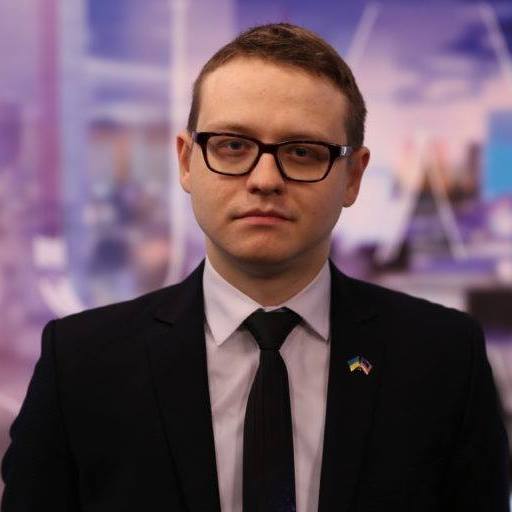
Mykola Bielieskov, Research Fellow at the National Institute for Strategic Studies under the President of Ukraine
Vladimir Putin's idea that Russia and the West should start negotiations on further non-enlargement of NATO were years in the should non be treated as something that came out of the blue. Numerous statements of the Russian President reiterated year after year make clear that the issue of NATO enlargement is a matter of special importance – both from the standpoint of how Russia conceives its national interests and as a personal matter to Putin.
Russia sees itself as a great power. From Russia's perspective, this status has taken a blow with the collapse of the USSR and NATO's enlargement from 16 to 30 members, leading to Russia's marginalization on European security issues.
Russia disregards the facts indicating that it was consulted all along the way when parameters of NATO enlargement were discussed. The 1997 Russia-NATO Founding Act contained provisions prohibiting the placement of nuclear weapons and major groupings of conventional forces in Alliance new member-states in order not to affect Russian security, conditioned with Moscow’s respect for sovereignty and territorial integrity of its neighbors. And NATO continues to abide by promises made almost 25 years ago despite Russian aggression against Ukraine.
[bctt tweet="From Russia's viewpoint, if NATO enlargement is a sign of Russia's weaknesses, then the West's readiness to abandon its NATO open-door policy proves that Russia is again a great power able to influence European security." username="euromaidanpress"]
However, NATO's further enlargement is also a personal question for Putin. His predecessors, Mikhail Gorbachev and Boris Yeltsin were forced to accept that united Germany would become a NATO member and could not stop the post-Cold War NATO enlargement. Vladimir Putin managed to reverse the trend thanks to the modernization and rearmament of Russia's Armed Forces, and it's possible that Vladimir Putin sees that the stars are aligning to give him a chance to positively contrast himself against his predecessors.
He may believe the time is right because President Biden's administration shows no signs of acknowledging that its pursuit of "stable and predictable" relations with Russia through restraint for NATO membership for Ukraine and Georgia, or seriously arming Ukraine has only emboldened Russia. Therefore, Putin might believe the US may accept the proposed bargain, or Moscow would continue to perpetuate a crisis along the border with Ukraine, therefore preventing the US from concentrating on China or US internal problems, the desire to concentrate on which was a justification for the said "predictable" relations with Russia.
Another reason might be NATO's next year summit in Madrid when NATO will ponder a new Strategic Concept to be adopted in 2022 instead of the outdated 2010 document. Putin may aim to get the non-enlargement of NATO enshrined in it.
Basically, with the idea of starting negotiations with NATO on guarantees of further Alliance non-enlargement Vladimir Putin is suggesting a kind of Faustian bargain – quite alluring on the surface but very risky and uncertain inside.
- First of all, it would be against all principles the West preaches and in itself a good way to compromise the West.
- Second, it would mean that the West tacitly accepts the Russian interpretation of the last 30 years of history -- that NATO enlargement was a bad thing, with no real proof of this. Or that Russia was right when it openly attacked Ukraine in 2014 to stop NATO enlargement -- a ridiculous notion in itself, as it was precisely Russian aggression that made Ukraine dispense with its non-aligned status and seek NATO membership.
- And last but not the least, all these grand bargains are not suitable for the XXIct, where the people's will need to be also accounted for. Even if we imagine that the West is ready to satisfy Putin’s wishes on further non-enlargement of NATO, Ukrainians will continue to stand for their country till Russia stops its aggression against Ukraine. And no grand bargain over the will of millions of Ukrainians can change this fact.
Related:

